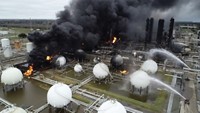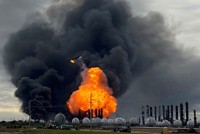Advertisement
Grab your lab coat. Let's get started
Welcome!
Welcome!
Create an account below to get 6 C&EN articles per month, receive newsletters and more - all free.
It seems this is your first time logging in online. Please enter the following information to continue.
As an ACS member you automatically get access to this site. All we need is few more details to create your reading experience.
Not you? Sign in with a different account.
Not you? Sign in with a different account.
ERROR 1
ERROR 1
ERROR 2
ERROR 2
ERROR 2
ERROR 2
ERROR 2
Password and Confirm password must match.
If you have an ACS member number, please enter it here so we can link this account to your membership. (optional)
ERROR 2
ACS values your privacy. By submitting your information, you are gaining access to C&EN and subscribing to our weekly newsletter. We use the information you provide to make your reading experience better, and we will never sell your data to third party members.
Industrial Safety
Explosion rocks a TPC butadiene plant in Texas
Cause of the blast, which injured three, is not known
by Alexander H. Tullo
November 27, 2019

An explosion at a TPC Group plant shook the community around Port Neches, Texas, at 1 a.m. on the morning of Wednesday, Nov. 27. A huge fireball breaking the nighttime stillness was captured on security cameras, and damage has been reported to nearby homes.
Two TPC workers and a contractor were injured in the blast and are being treated in area hospitals. TPC says it has accounted for all of its personnel. As of 6:40 a.m., first responders were still fighting to control the resulting blaze.
The Port Neches plant takes in crude C4 chemical streams from area refineries and extracts butadiene, a raw material for synthetic rubber and engineering polymers. As of 2012, when the company last disclosed financial information to the public, the site had a capacity to produce about 220,000 metric tons of butadiene per year. It also sells coproduct C4 streams.
TPC bought the facility from Huntsman Corp. in 2006. At one time, the site also made the fuel additive methyl tert-butyl ether.
The private equity firms SK Capital and First Reserve bought TPC in 2012. In early 2018, TPC announced it would expand crude C4 processing capacity through small improvement projects at its plants. The company claims a 35% share of the North American butadiene market,
TPC says the blast occurred in a processing unit but that it does not yet know the cause. It is promising an investigation.




Join the conversation
Contact the reporter
Submit a Letter to the Editor for publication
Engage with us on Twitter